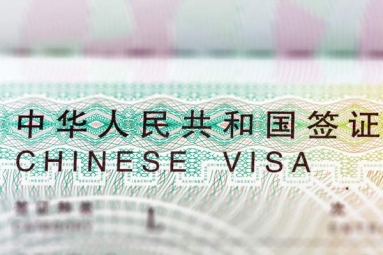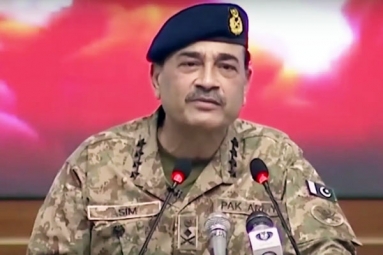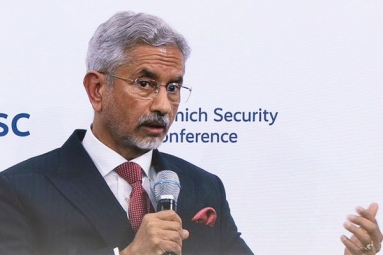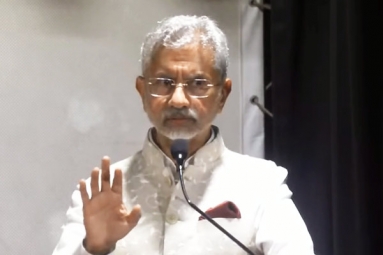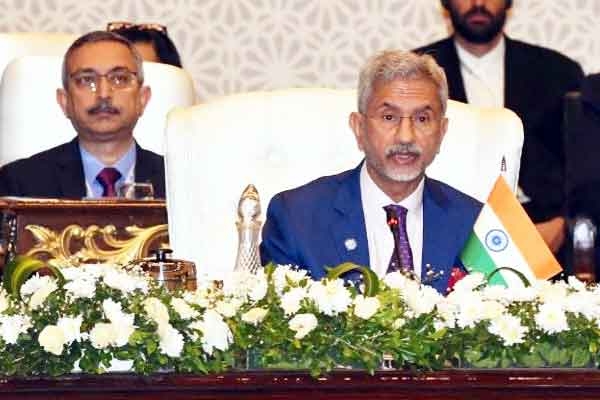
(Image source from: x.com/DrSJaishankar)
The minister indirectly referred to China and Pakistan, stating that if there is a lack of trust, inadequate cooperation, insufficient friendship, and missing good neighborly relations, there are reasons to reflect and address the underlying issues. At the Shanghai Cooperation Organisation meeting, the minister highlighted the key challenges of combating terrorism, separatism, and extremism. The minister emphasized the importance of an honest conversation and reaffirming the organization's charter to fully realize the benefits of cooperation and integration.
The speaker acknowledged the challenging global landscape, including ongoing conflicts, the devastating impact of the Covid-19 pandemic, and various disruptions affecting growth and development. He emphasized the importance of the SCO charter, particularly Article 1, which outlines the organization's goals of strengthening mutual trust, friendship, and good neighborliness, as well as promoting multifaceted cooperation and balanced growth, integration, and conflict prevention. The speaker urged the members to reflect on these principles and challenges outlined in the charter. The SCO's main focuses were fighting against terrorism, separatism, and extremism.
Jaishankar emphasized that fully embracing the principles of the Charter is crucial to reap the benefits of cooperation and integration. He acknowledged the shift towards multipolarity and the realities of globalization and rebalancing, which have created new opportunities for trade, investment, connectivity, and collaboration. Jaishankar emphasized that the region would greatly benefit from such efforts, and others would draw inspiration from them. However, he cautioned that cooperation must be founded on mutual respect, sovereign equality, and recognition of territorial integrity and sovereignty. It should be built on genuine partnerships, not unilateral agendas, and cannot progress if selective global practices, particularly in trade and transit, are adopted.
The government of India claims that Pakistan's actions violate India's territorial integrity and sovereignty. Additionally, Pakistan does not allow Indian goods to pass through its land to reach Central Asia. However, the minister emphasized that progress can only be achieved when countries remain committed to the principles of the UN Charter. He stated that development and growth require peace and stability, and that activities characterized by terrorism, extremism, and separatism are unlikely to encourage trade, energy flows, connectivity, and people-to-people exchanges. The minister also discussed the vast opportunities that could arise if these issues were resolved, such as enhanced industrial cooperation, increased competitiveness and employment, expanded resources, and greater investment flows, which would benefit the business communities through larger networks.
“Joint communication creates new efficiencies, and the world of logistics is also expected to change significantly for energy security, it is clear that culture, education and sport are actually also promising areas. Mention India’s initiatives and examples that can be emulated. From an Indian perspective, our global and national initiatives are also closely linked to those of South Africa. The Global Biofuels Alliance is making a difference in health and the environment.”
At the same time as this group of non-Western countries met, he called for a reform of multilateralism and a reform of the United Nations (UN). Each of us contributes, but the global order is greater than the sum of its parts, and global institutions must keep pace. Comprehensive reforms of the United Nations Security Council, both permanent and permanent, are necessary. This is important because China and Pakistan reject India's application for permanent membership in the United Nations.
We would like to remind you that the Astana Conference in July 2024 recognized that the credibility and effectiveness of the United Nations depends on ensuring the representation of developing countries through comprehensive reforms in the future treaty recently adopted by the United Nations General Assembly Nations adopted the Security Council to make it more representative, inclusive, transparent, efficient and effective. The SCO should be at the forefront of advocating for such changes and not ignore such an important issue.
Exhorting the members to lead a responsible life, he said, “We must now renew our resolve to achieve the goals of SEO. This means acknowledging the current barriers to cooperation and focusing on the way forward.” This will certainly happen if a solid agenda based on mutually agreed interests is developed and implemented. In addition, it must comply with all mandatory and prohibited obligations clearly stated in the statute. After all, the SCO represents the forces of change in which much of the world is investing a significant portion of its savings. We fulfill that responsibility."
Opening the SEO session, Pakistan Prime Minister Shehbaz Sharif said: “Let us prioritize cooperation over political differences, build on our successes, overcome common challenges and work hand in hand to make SEO a symbol of stability, growth and development be." Jaisankar landed at the SCO meeting on Tuesday, the first visit by an Indian foreign minister to Pakistan in nearly nine years - the foreign minister last visited Pakistan in December 2015.






